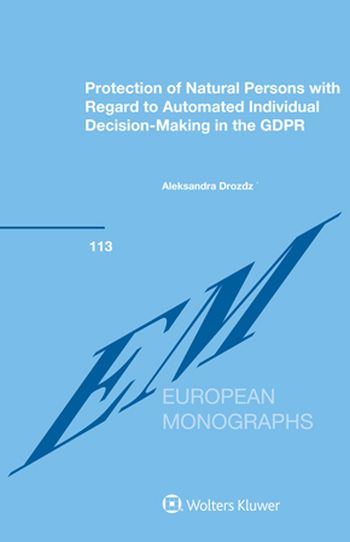
Protection of Natural Persons with Regard to Automated Individual Decision-Making in the GDPR describes and analyses the GDPR aimed at protecting natural persons with regard to automated individual decision-making. The book’s objective is to examine whether this legislative act affords sufficient protection of natural persons with regard to such processing. Increasingly, algorithms regulate our lives. Personal data is routinely processed on an unprecedented scale in both private and public sectors. This shift from more subjective and less structured human decision-making processes to automated ones has provoked numerous concerns with regard to the rights and freedoms of natural persons affected. In particular, those attached to profiling that can lead to discrimination influencing crucial opportunities of individuals, such as the ability to obtain credit, insurance, education, a job or even medical treatment. To the extent that automated individual decision-making is based on personal data, in the European Union it is subject to the GDPR.
What’s in this book:
The author aims at identifying the loopholes that hinder or prevent its efficacy and the de lege lata rules and de lege ferenda postulates that could provide individuals with effective protection in relation to automated individual decision-making. She provides an in-depth analysis of such aspects as the following:
To interpret the rules of the GDPR, the analysis draws on the travaux préparatoires, case law of the Court of Justice of the European Union and national courts that concern the previous Data Protection Directive, guidelines and opinions of the Article 29 Working Party and the European Data Protection Board, various reports and recommendations and numerous academic writings.
How this will help you:
In its consideration of some of the most controversial issues in the realm of personal data protection, this book represents a major contribution to research and legal guidance at the confluence of law and new technologies concerning algorithmic accountability. Policymakers, regulators and lawyers active in the ongoing development of personal data protection law will become knowledgeable about interpretations and guidelines formulated by European data-protection authorities. Understanding the current challenges related to protection of natural persons with regard to automated individual decision-making in the GDPR, the analysis carried out in this book will assist data-protection authorities and judicature in assessing such systems and interpreting the GDPR framework in the years to come.